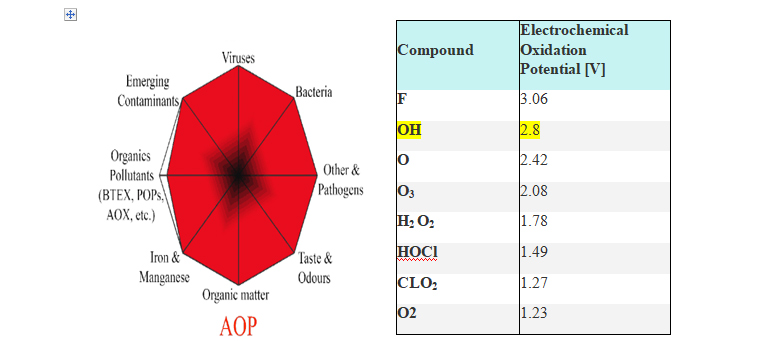info@enweclean.com
+91-93151 31454

The Advance Technologies are applied and tested wastewater treatment technologies and the integration of advanced processes to remove refractory organic contaminants and long chain compounds. It discusses the potential of enhanced biological treatment to produce effluent suitable for reuse and new processes.
 Advance Oxidation Process (AOP)
Advance Oxidation Process (AOP)
 Electro-Coagulation Reaction (ECR)
Electro-Coagulation Reaction (ECR)
A variety of organic compounds are classified as refractory when they're poorly biodegraded and/or exhibit a low value for the ratio of Biological Oxygen Demand to Chemical Oxygen Demand (BOD: COD)
Advanced oxidation processes, in a broad sense, are a set of chemical treatment procedures designed to remove organic materials in water and wastewater by oxidation through reactions with hydroxyl radicals.
AOP of refractory compounds can result in formation of oxidized effluents that are much more biodegradable than the starting compound. Therefore, effluents produced from AOP of aqueous solutions of these refractory compounds exhibit high values for BOD:COD ratios, and also show higher oxygen uptakes than their respective untreated parent compounds indicating they're more amenable to biological treatment.

The current conventional biological or membrane base [MBR] waste water treatment cannot cope up with the refractory COD. This results in drop in efficiency & decrease in indicative BOD to COD ratio in waste water units.
To take care of these conditions one requires highest degree of oxidation potentials, 2.8mV of hydroxyl radicals (OH), which is more than any one individual form.
Advance oxidation is the best option so called “Best Available Technology” (BAT).
Electrocoagulation (EC) has been suggested as an advanced alternative tochemical coagulation in pollutant removal from raw waters and wastewaters. Inthis technology, metal cations are released into water through dissolving metalelectrodes. Simultaneously, beneficial side reactions can remove flocculatedmaterialfrom the water. However, there are also adverse side reactions, such asdeposition of salts on the electrode surface, which may cause deterioration ofremoval efficiency after long operation. As in the case of chemical coagulation withmetal salts, aluminium or iron cations and hydroxides are the active compounds inEC.

Electrocoagulation is a technique used for wastewater treatment and industrial processed water. Electrocoagulationhas become a rapidly growing area of wastewater treatment due to its ability to remove contaminants that aregenerally more difficult to remove by filtration or chemical treatment systems, such as emulsified oil, total petroleumhydrocarbons, refractory organics, suspended solids, and heavy metals.

is an Global Player in Clean Environmental Solutions for Water Treatment, Wastewater Treatment and Waste to Energy Sector. EnWe Clean provides Innovative Solutions, Technologies and Services for Water, Wastewater and Waste to Energy within Government sector and diverse industries.